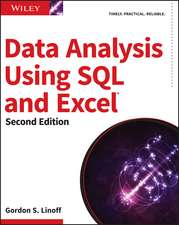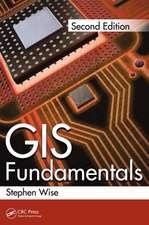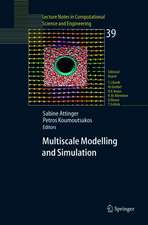Mathematical Modelling
Editat de Seppo Pohjolainen Autor Matti Heiliö, Timo Lähivaara, Erkki Laitinen, Timo Mantere, Jorma Merikoski, Kimmo Raivio, Risto Silvennoinen, Antti Suutala, Tanja Tarvainen, Timo Tiihonen, Jukka Tuomela, Esko Turunen, Marko Vauhkonenen Limba Engleză Hardback – 26 iul 2016
The book combines classical approaches to modelling with novel areas such as soft computing methods, inverse problems, and model uncertainty. Attention is also paid to the interaction between models, data and the use of mathematical software. The reader will find a broad selection of theoretical tools for practicing industrial mathematics, including the analysis of continuum models, probabilistic and discrete phenomena, and asymptotic and sensitivity analysis.
| Toate formatele și edițiile | Preț | Express |
|---|---|---|
| Paperback (1) | 452.25 lei 43-57 zile | |
| Springer International Publishing – 31 mai 2018 | 452.25 lei 43-57 zile | |
| Hardback (1) | 459.53 lei 43-57 zile | |
| Springer International Publishing – 26 iul 2016 | 459.53 lei 43-57 zile |
Preț: 459.53 lei
Nou
Puncte Express: 689
Preț estimativ în valută:
87.96€ • 95.58$ • 73.93£
87.96€ • 95.58$ • 73.93£
Carte tipărită la comandă
Livrare economică 21 aprilie-05 mai
Preluare comenzi: 021 569.72.76
Specificații
ISBN-13: 9783319278346
ISBN-10: 3319278347
Pagini: 237
Ilustrații: XI, 242 p. 56 illus., 13 illus. in color.
Dimensiuni: 155 x 235 x 16 mm
Greutate: 0.54 kg
Ediția:1st ed. 2016
Editura: Springer International Publishing
Colecția Springer
Locul publicării:Cham, Switzerland
ISBN-10: 3319278347
Pagini: 237
Ilustrații: XI, 242 p. 56 illus., 13 illus. in color.
Dimensiuni: 155 x 235 x 16 mm
Greutate: 0.54 kg
Ediția:1st ed. 2016
Editura: Springer International Publishing
Colecția Springer
Locul publicării:Cham, Switzerland
Public țintă
Upper undergraduateCuprins
1 Introduction by S. Pohjolainen and M. Heiliö.- 2 Models and Applications by M. Heiliö.- 3 Viewpoints on Systems and Models by E. Laitinen.- 4 Integer Models by R. Silvennoinen and J. Merikoski.- 5 Data Based Models by J. Merikoski et al.- 6 Soft Computing Methods by E. Turunen et al.- 7 Dimensional Analysis by T. Tiihonen.- 8 Modelling With Differential Equations by J. Tuomela.- 9 Continuum Models by T. Tiihonen.- 10 Simplification of Models by T. Tiihonen.- 11 Acoustic Modelling by S. Pohjolainen and A. Suutala.- 12 Inverse Problems by M. Vauhkonen et al.- 13 Project Titles by M. Heiliö.
Recenzii
“Mathematical modelling is a product of several different contributors, all from Finnish universities. The result is a text used by over 2,000 students. … This is an excellent book, written with a myriad of interesting and very practical problems and applications. The contributors to the text are obviously scientific scholars who are elegantly educated.” (James Van Speybroeck, Computing Reviews, March, 2017)
Notă biografică
Seppo Pohjolainen received his PhD degree in applied mathematics in 1980 from Tampere University of Technology (TUT). In 1998 he was appointed as a professor in mathematics at TUT.
His research interests include mathematical control theory, distributed parameter systems, mathematical modelling and simulation, development and use of information technology to support learning. Currently he is leading a nationwide network in Finland on teaching mathematical modelling on the Internet. He has led several national and international research projects and written a number of journal articles and conference papers on all these fields.
His research interests include mathematical control theory, distributed parameter systems, mathematical modelling and simulation, development and use of information technology to support learning. Currently he is leading a nationwide network in Finland on teaching mathematical modelling on the Internet. He has led several national and international research projects and written a number of journal articles and conference papers on all these fields.
Textul de pe ultima copertă
This book provides a thorough introduction to the challenge of applying mathematics in real-world scenarios. Modelling tasks rarely involve well-defined categories, and they often require multidisciplinary input from mathematics, physics, computer sciences, or engineering. In keeping with this spirit of modelling, the book includes a wealth of cross-references between the chapters and frequently points to the real-world context.
The book combines classical approaches to modelling with novel areas such as soft computing methods, inverse problems, and model uncertainty. Attention is also paid to the interaction between models, data and the use of mathematical software. The reader will find a broad selection of theoretical tools for practicing industrial mathematics, including the analysis of continuum models, probabilistic and discrete phenomena, and asymptotic and sensitivity analysis.
The book combines classical approaches to modelling with novel areas such as soft computing methods, inverse problems, and model uncertainty. Attention is also paid to the interaction between models, data and the use of mathematical software. The reader will find a broad selection of theoretical tools for practicing industrial mathematics, including the analysis of continuum models, probabilistic and discrete phenomena, and asymptotic and sensitivity analysis.
Caracteristici
Covers the most important classical and modern methods of mathematical modelling Can be used as textbook or as complimentary material in mathematical modelling courses Contains 31 project titles as well as 124 problems sets






















